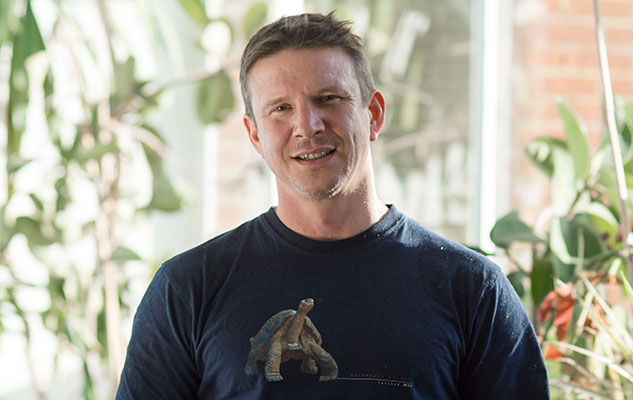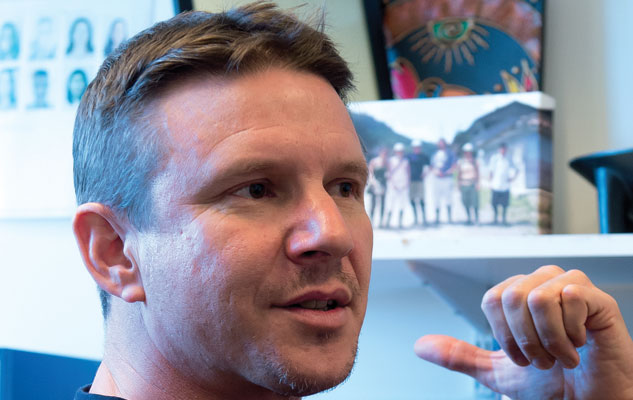Mika Peck
Mika Peck is a Lecturer in Biology with the School of Life Sciences at the University of Sussex.

Mika’s research story
Rescuing the brown-headed spider monkey from extinction has long been the spur for Mika Peck’s research. But his work is not simply about saving a single species. This elegant and elusive primate lies at the heart of the survival of the Ecuadorian rainforest, and is inextricably linked with the livelihoods of the local people.
The focus of Mika’s work is an area of Ecuador called el Chocó – a rainforest network recognised as one of the most biologically and culturally diverse habitats in the world. It’s also one of the fastest disappearing because of unsustainable logging practices, mining and deforestation by local cacao farmers (cacao is the key ingredient in chocolate).
As a result of the destruction of its forest home, the brown-headed spider monkey is now among the world’s 25 most endangered primates, with numbers estimated at no more than 250.
It’s not just the love of these particular monkeys that motivates Mika, in spite of the fact that they often throw branches at him. What’s crucial is their significance for the rainforest. If the monkeys are living in an area, they’re an excellent indicator of good-quality pristine forest. They’re also particularly important seed-spreaders, vital for maintaining plant diversity, which in turn supports countless animal species.
The brown-headed spider monkey underlines how the whole ecosystem is connected. ‘Save one species and countless others benefit,’ says Mika.
And when you consider that tropical rainforests are thought to be home to half of the world’s animal and plant species, act as carbon sinks regulating climate, and are the source of over one-quarter of natural medicines known to man, the global importance of Mika’s work becomes clear.
We’re all here because of biodiversity. Humans evolved because of it and our continued survival as a species depends upon it. In the short time we each have on earth we should be focusing on that. It’s why I do what I do.” Mika Peck
Lecturer in Biology
So Mika is trying to halt the decline of a species, setting in motion a whole range of initiatives. He is educating the local population so that they stop hunting the monkeys, encouraging eco- and scientific tourism, establishing protected reserves, and enabling people to take up alternative livelihoods so that communities no longer have to rely on non-sustainable sources of income.
The scale of his work is huge both geographically and in terms of the difference it’s making.
Critical for Mika is the need to get local people on board – he calls them ‘weapons of mass conservation’.
He has set about recruiting and training field researchers known as parabiologists. ‘They have the greatest local knowledge and superb observation skills. In turn, you share research skills and knowledge with them. Together that makes a very powerful contribution to the research and you gain people’s understanding. Whole communities become invested in conservation and in developing the land sustainably.’

Mika also realised he needed to convince the local cacao producers to stop clearing the forest for their planting and, as part of this effort, the Chocó project was born.
The project works with producers to get them a fair and sustainable price for their cacao. In return, they’ve agreed to partially reforest their land and shift to sustainable farming of cacao.
It’s an ethical chocolate business where profits are reinvested into conservation projects. Both farmers and monkeys are benefitting.
The generosity and far-sightedness of Sussex alumni and other major donors has also made the purchase of land like the Tesoro Escondido Spider Monkey Reserve possible. Not only are the monkeys protected but the reserve is expanding to become a community research hub, attracting students and researchers from around the world.
Reserves like Tesoro Escondido, together with fair pricing deals for farmers, offer a model that has potential to make a difference wherever in the world environmental degradation and poverty go hand in hand.
‘We’re all here because of biodiversity,’ concludes Mika. ‘Humans evolved because of it and our continued survival as a species depends upon it. In the short time we each have on earth we should be focusing on that. It’s why I do what I do.’
Find out more about Mika’s research.